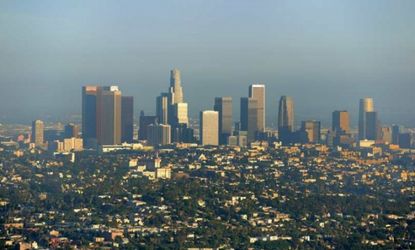Discovered: A link between air pollution and autism?
Researchers say that children exposed to high levels of pollutants are two to three times more likely to develop the hard-to-pinpoint condition

The question: Previous studies have shown that kids who live closer to freeways are more likely to develop autism, a disease that now affects 1 in 88 children in the United States. However, the exact root of the condition — with a spectrum that ranges from the less-severe Asperger's syndrome to full-blown autism — has been the subject of intense public debate in recent years. Some scientists attribute autism's rise to genetics, aging parents, and premature births, while others blame environmental factors like mercury and similar airborne pollutants. This study takes a deeper dive into the question of whether air pollution emitted from automobiles plays at least a small role in the disease's rise.
How it was tested: This study, published in the Archives of General Psychiatry, compared 270 autistic children with 245 children without the disorder. Researchers asked the children's mothers to give an address for each home they lived in during pregnancy and during the child's first year of life. Using traffic volume, vehicle emissions, wind patterns, and regional estimates of pollutants, researchers estimated each child's likely pollution exposure during this timeframe. The study did not, however, take into account indoor pollutants such as second-hand smoke.
The outcome: Children in the top 25 percent of pollution exposure were far more likely to develop autism than children in the bottom 25 percent. In fact, kids in the highest tier were two to three times likelier to be diagnosed with the disease.
Subscribe to The Week
Escape your echo chamber. Get the facts behind the news, plus analysis from multiple perspectives.

Sign up for The Week's Free Newsletters
From our morning news briefing to a weekly Good News Newsletter, get the best of The Week delivered directly to your inbox.
From our morning news briefing to a weekly Good News Newsletter, get the best of The Week delivered directly to your inbox.
What experts say: "We're not saying traffic pollution causes autism, but it may be a risk factor for it," says lead author Heather Volk, an assistant professor at the Keck School of Medicine of the University of Southern California in Los Angeles. "Autism is a complex disorder and it's likely there are many factors contributing." Still, the findings are helpful, says Geraldine Dawson of the University of North Carolina at Chapel Hill, because "this is a risk factor that we can modify."
The lesson: Air pollution from small particles has been known to contribute to heart attacks, early death, asthma, and more, according to the U.S. Environmental Protection Agency. Now, air quality could be a contributing factor to the brain disorder, although more research is necessary to determine exactly how much of a problem it is for children.
Sign up for Today's Best Articles in your inbox
A free daily email with the biggest news stories of the day – and the best features from TheWeek.com
Create an account with the same email registered to your subscription to unlock access.
-
 'Good riddance to the televised presidential debate'
'Good riddance to the televised presidential debate'Instant Opinion Opinion, comment and editorials of the day
By Harold Maass, The Week US Published
-
 Caitlin Clark the No. 1 pick in bullish WNBA Draft
Caitlin Clark the No. 1 pick in bullish WNBA DraftSpeed Read As expected, she went to the Indiana Fever
By Peter Weber, The Week US Published
-
 Today's political cartoons - April 16, 2024
Today's political cartoons - April 16, 2024Cartoons Tuesday's cartoons - sleepyhead, little people, and more
By The Week US Published